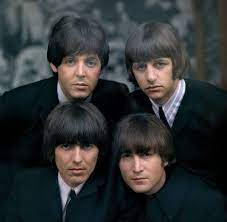Jill Scott, "The Way"
Jill Scott, “The Way”
Jill
Scott has had a lot more commercial success than a lot of her peers in the
neo-soul genre. Her single “The Way” from her 2000 album Who Is Jill Scott?: Words and Sounds, Vol. 1 is a representative
track from the early part of her career and also shows the links between
neo-soul and earlier soul music subgenres. I’ve always found this song calming.
It features a fairly slow “walk” tempo with a few minor chords in the verses
and the chorus. While it is a fairly simple song in structure and
instrumentation, it also captures a blissed-out feeling of love and
relationship happiness well while introducing a lot of listeners to Jill
Scott’s emotional and poetic songwriting style. (Scott co-wrote this song with
her producer Andre Harris, of Dre and Vidal.)
The
song features an introduction that establishes the slow tempo, and that chord
progression shows up again in the chorus, adding a sense of the familiar to the
song and reminding listeners of the lyrical focus on familiarity within a
relationship. The line that appears in the chorus four times is the following
rhetorical question of a blissful lover: “Is it the way…you love…me, baby?” The
vocal on the chorus stretches a bit to accommodate the slow tempo of the
bassline. While another type of love song would focus more on addressing this
question or examining the relationship for things that work well (like “My
Girl” by The Temptations) or things that are going wrong (like “How You Gonna
Act Like That” by Tyrese) or things that worked well but that went unnoticed
and unappreciated by the speaker (like “Use ta Be My Girl” by The O’Jays), “The
Way” features lyrics that are content to wonder in unresolved ways about what
parts of the relationship have made it feel so wonderful.
The
song features a fairly detailed storyline, even though it leaves its questions
unresolved in surprising ways. In “The Way,” the verses present an
introspective monologue of a happy morning and then a fairly complex dialogue
(for only one voice, Scott’s). On many of Scott’s earlier songs, she pulls from
her background as a poet and spoken-word artist to present vignettes of urban
adult life that are impressively precise, witty, and also often quotidian. The
first verse, as mentioned before, is all three of those things. This vignette
tells listeners that the speaker has a fairly normal weekday morning involving
cleanup, breakfast, and grabbing items for work before just hinting at the
emotional tenor of the morning by sharing that she walked to work “beaming all
the way.” That phrase is brief and is the only hint in the first part of the
song that it is a love song, though the music calls to mind earlier R&B
love songs. The ordinariness of the opening lyrics pairs with the basic,
laid-back melody to create an inviting energy to the song. The dialogue in the
second verse involves an at-work conversation where the speaker coyly declines
an invitation to go to a dance club with her girls. The other voice (presumably
a telephone voice) is also recognizably Scott’s, but with a quieter vocal mix,
calling to mind techniques used in spoken-word poetry for narrating a
conversation. In this part of the song, the other speaker isn’t singing the
lines, and has a rushed tone in her words. The speaker’s voice (again, they are
both really Jill Scott’s voice) features the blissed-out, relaxed tempo from
the earlier portions of the song, establishing that this voice is separate from
the busy, professional world around it. The telephone voice understands the
experience of the other voice (“Oh, word?”), but isn’t experiencing that same
relaxing energy and thus can’t approximate the pace of the song.
The chorus again
asks why the love feels this way and why the speaker experiences this
relationship as a cocoon that holds external stresses of urban professional
life away from her. And that question is still lingering after this chorus as
an unresolved question, yet there isn’t any distress in the voice relating to
this. The fadeout part of the song places emphasis on the string section,
connecting it to earlier Philadelphia soul from The Spinners and other artists.
The songs on
Jill Scott’s first album establish her as a unique vocal talent and songwriter
who connects with talented producers and production teams. The vignettes of the
lyrics present glimpses into the varied experiences of a contemporary woman.
These experiences are sometimes challenging but often happy. “The Way” has a
classic soul music feel and a simplicity that could have become generic if it
had been written with less creativity, but also reaches out to listeners in a
unique way with the preciseness and little-heard dialogue in its lyrics.

Comments
Post a Comment